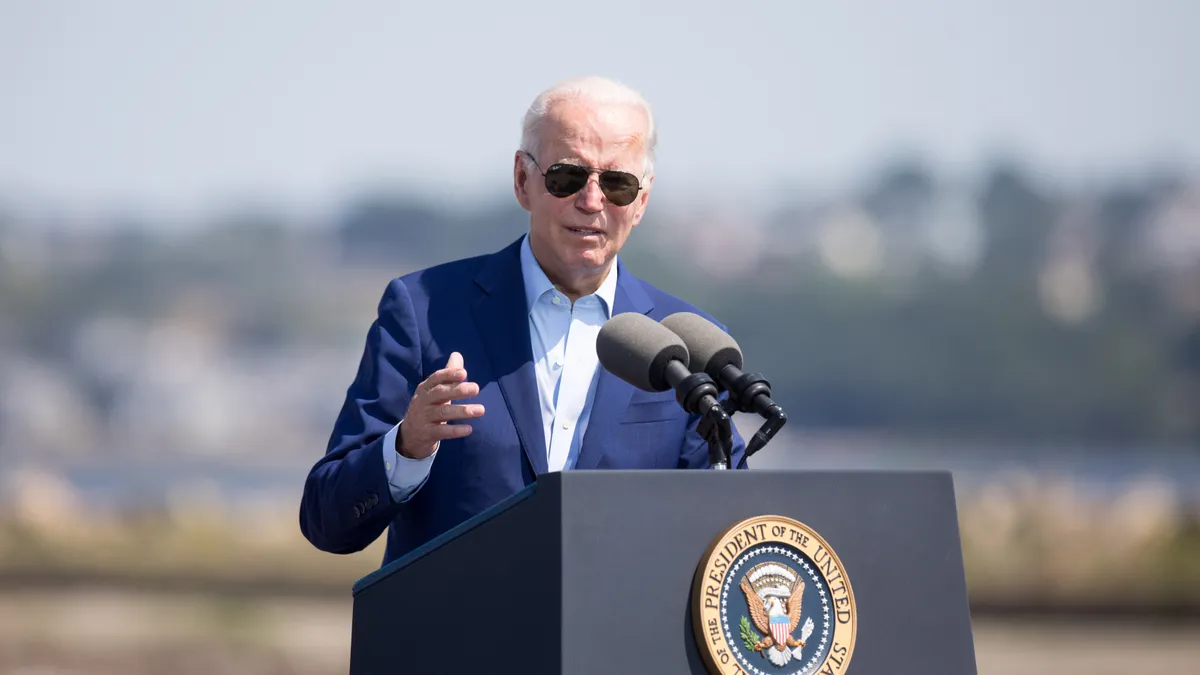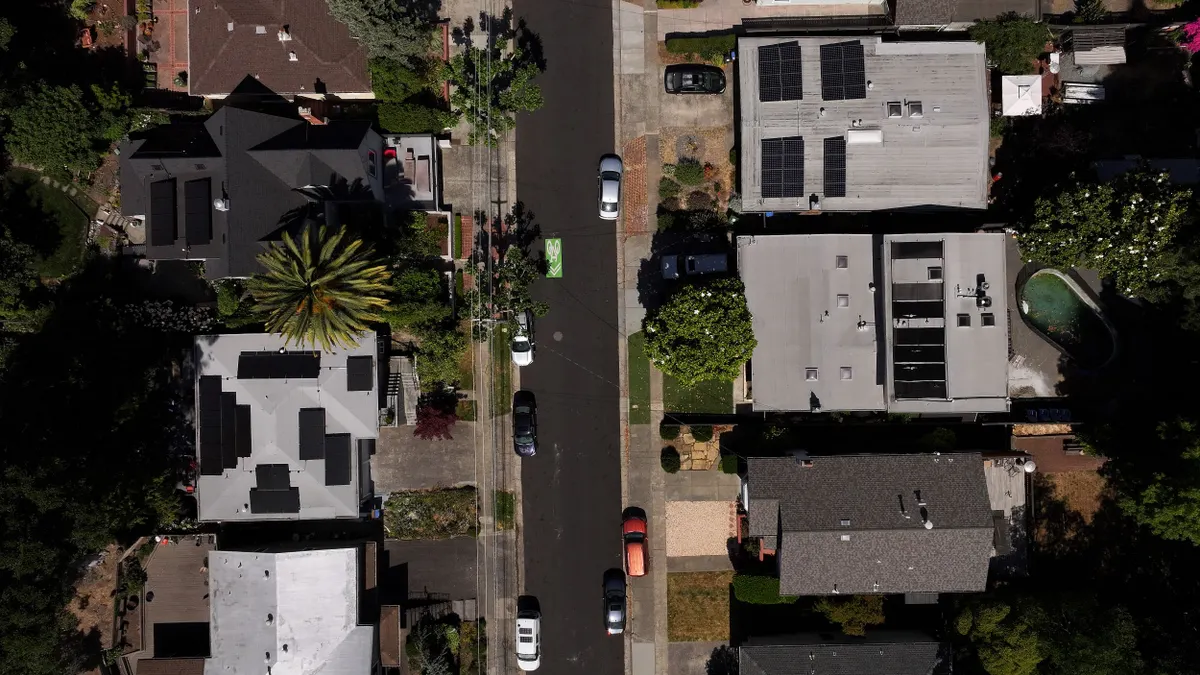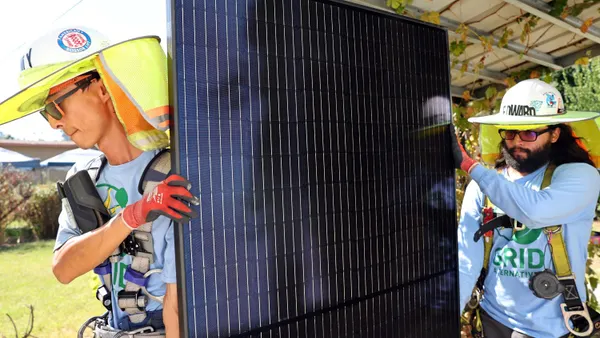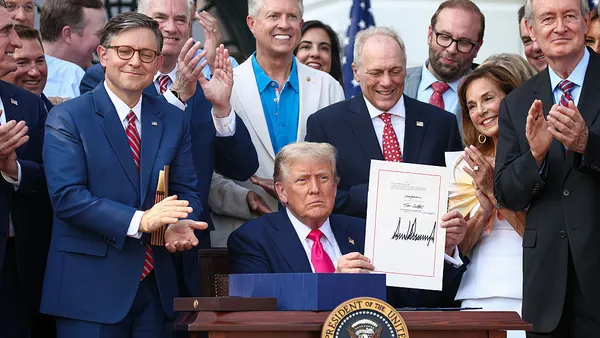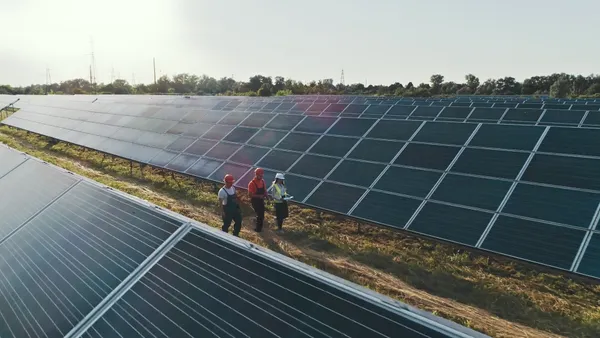Dive Brief:
-
Calling climate change a “clear and present danger,” President Joe Biden Wednesday said the White House is more than doubling to $2.3 billion a grant program for infrastructure resiliency that can include microgrids, energy storage and other measures.
-
Besides increasing the Building Resilient Infrastructure and Communities, or BRIC, program, Biden also called on the Interior Department to auction up to 700,000 acres in the Gulf of Mexico for offshore wind farms. He said the department will continue to spur innovation, while speaking at a former coal-fired power plant near Boston that now supports the offshore wind industry.
-
Biden didn’t declare a climate emergency, as some groups and Democrats wanted. “Biden’s fighting fire with the trickle from a garden hose,” Jean Su, Energy Justice program director at the Center for Biological Diversity, said Wednesday in a statement. “Saying we’re in a climate emergency and declaring one under the law are totally different things. Declaring a climate emergency will unleash the full force of Biden’s executive powers to combat climate chaos.”
Dive Insight:
About a week after Sen. Joe Manchin, D-W.Va., scuttled plans for broad climate legislation, Biden announced several modest climate-related efforts during his visit to the retired Brayton Point power station in Somerset, Massachusetts, but said he planned to do more in the coming weeks through proclamations, executive orders and regulatory actions.
Some Democrats and advocacy groups had been urging Biden to declare a national climate emergency, which they said would expand his options for moving to reduce greenhouse gas emissions. The Center for Biological Diversity issued a report earlier this year outlining the steps Biden could take after declaring a climate emergency.
Before Biden’s speech, Gina McCarthy, the national climate advisor, explained the White House’s thinking around not declaring a climate emergency.
“We need to be thoughtful about this, and we want to outline actions, not just declare things,” McCarthy said. “While Congress didn’t move forward, that just is driving [Biden] to move forward with much clearer plans and much larger and more accelerated commitments.”
Climate change is increasingly affecting the United States. Earlier this year, the North American Electricity Reliability Corp. warned that about two-thirds of the United States faced heightened risk of rolling blackouts, partly because of drought.
Last year, the United States was hit with 20 extreme weather- and climate-related disasters with losses of more than $1 billion each. The combined losses totaled more than $145 billion, Biden said.
Besides starting the process to open the Gulf of Mexico to wind farms, Biden directed Interior Department Secretary Deb Haaland to advance offshore wind and other clean energy development off the coasts of Florida, Georgia, South Carolina and North Carolina.
Biden said the directive would remove uncertainty about development in those areas created during the Trump administration.
With a goal of adding 30 GW of offshore wind by 2030, the Biden administration is evaluating six additional lease areas in the mid-Atlantic, stretching from the coast of North Carolina to Delaware, in addition to advancing two lease areas auctioned earlier this year off the coast of North Carolina. The Bureau of Ocean Energy Management is also seeking public input on the identification of two potential wind energy areas in the Gulf of Mexico.
Biden also increased the funding for the Federal Emergency Management Agency’s BRIC program for fiscal year 2022, which he said will help communities prepare for heat waves, drought, wildfires, floods and hurricanes.
As part of the climate push, the Department of Health and Human Services issued guidance Wednesday that expands how states, tribes and territories can use the Low Income Home Energy Assistance Program for efficient air conditioning equipment and community cooling centers.
Biden urged governors, utilities and state utility regulators to support efforts to limit climate change.
“While so many governors and mayors have been strong partners in this fight to tackle climate change, we need all governors and mayors,” Biden said. “We need public utility commissioners and state agency heads. We need electric utilities and developers to stand up and be part of the solution.”



